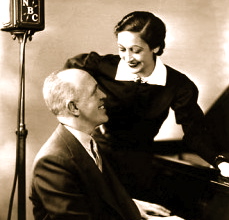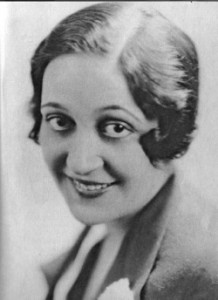Dorothy Fields

Dorothy Fields: ” Wild Women of Song”
In this episode of “Wild Women of Song” we continue talking about the life and outstanding career of Dorothy Fields! When I mention Dorothy Fields’ name on stage, I usually get a blank look from the patrons in the night club, perhaps a little polite applause. Then I start to bring up just a few of her over 400 titles: “I Can’t Give You Anything But Love” “On the Sunny Side of the Street” “Pick Yourself Up”, “The Way You Look Tonight” “Hey Big Spender” and I’m greeted by a powerful wave of applause and happy recognition.
 On the Sunny Side of the Street: The Lyrics of Dorothy Fields
On the Sunny Side of the Street: The Lyrics of Dorothy Fields
Dorothy Fields was the only woman to achieve wide acclaim as a songwriter during the ‘golden age’ of popular song in the first half of the 20th century. She held her own against great male lyricists like Johnny Mercer and Ira Gershwin, and she was the first woman to be elected into the Songwriter’s Hall of Fame. Lyricist Richard Maltby, Jr. wrote about her, “A Fields’ lyric is always meticulously crafted yet retains the easy, fresh natural flow of colloquial speech. Her language is precisely the language a person would use expressing a feeling, even if it weren’t sung or rhymed—yet the rhyme schemes are scrupulous and the structures impeccable.” This week on Riverwalk Jazz, vocalist Nina Ferro, a listener-favorite from Melbourne, Australia joins The Jim Cullum Jazz Band in performances of Dorothy Fields songs, including “The Way You Look Tonight,” “Exactly Like You” and “Blue Again.” Fields grew up in a New York show business family in an atmosphere of jokes, one-liners and funny routines. Her father, Lew Fields was a vaudeville star and producer in the 1910s. Though he tried to keep his rough-edged theater friends away from his family it didn’t work. He was horrified when his young daughter announced that she wanted to be an actress. Dorothy settled for writing song lyrics, a profession her father considered un-ladylike.
 Jimmy McHugh and Dorothy Fields in 1933. AP Photo byPeter Mintum Co.
Jimmy McHugh and Dorothy Fields in 1933. AP Photo byPeter Mintum Co.
Dorothy Fields’ very first “monster” hit got off to a rough start. She wrote “I Can’t Give You Anything But Love” with Jimmy McHugh. When Fields and McHugh used it in a show called Blackbirds of 1928 on Broadway, it got terrible reviews. The critics called it a “sickly, puerile song.” At that point Dorothy’s father asked her, “Well, are you satisfied? Now will you get out of show business?” But, the show’s producer didn’t listen to the critics. In spite of the bad reviews, he added a midnight show and suddenly Blackbirds was the hottest ticket in town, and “I Can’t Give You Anything But Love” became an enormous hit still popular today. Fields went to Hollywood in the 1930s and collaborated with composer Jerome Kern on four films. Their finest score was for the Astaire/Rogers movie musical Swing Time, with the songs “Pick Yourself Up,” “A Fine Romance” and “The Way You Look Tonight.” In 1939 Fields returned to New York, and with her brother Herbert, wrote the librettos for three Cole Porter hit shows of the 1940s. Her own pet project was a starring vehicle for Ethel Merman based on the story of Annie Oakley. The show became Annie Get Your Gunwith a score by Irving Berlin. Fields continued to enjoy Broadway successes late in her career with A Tree Grows In Brooklyn (1951), Sweet Charity (1966) and Seesaw (1973).
 Dorothy Fields said about the art of songwriting:
Dorothy Fields said about the art of songwriting:
“I wrote…the words to “I Feel a Song Coming On,” but I don’t believe a word of it. A song just doesn’t ‘come on.’ I’ve always had to tease it out, squeeze it out…it’s hard slave labor. Ask anyone who writes—it’s slave labor and I love it.”
Photo credit for home page teaser image: Dorothy Fields and Jimmy McHugh. Photo courtesy discogs.com
http://riverwalkjazz.stanford.edu/program/sunny-side-street-lyrics-dorothy-fields

